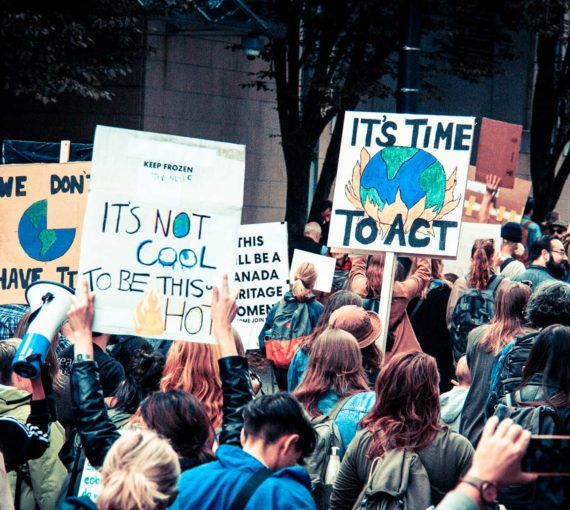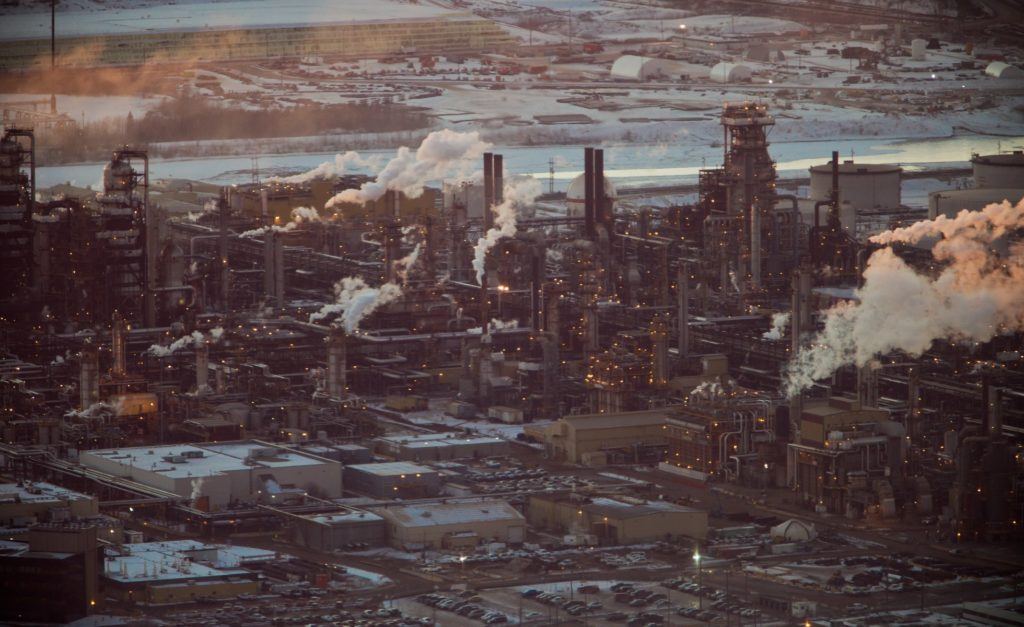
Canada’s industrial carbon pricing system is working to make polluters pay for their pollution. (Photo: Kris Krüg via Flickr)
After decades of denial, governments around the world now agree: we need to stop burning fossil fuels if we want a stable climate that supports all life on Earth.
Industry has also agreed to some baby steps toward climate action: in Canada, leading oil and gas companies have pledged to work toward Canada’s net-zero emissions by 2050.
But we now know that for the past half-century, the oil and gas industry has invested billions of dollars in dishonest, deceptive marketing campaigns, designed to sow doubt in climate science and convince people that fossil fuels have a place in a net-zero future.
So, in a world of climate pledges and greenwashing campaigns, how can we tell if companies are telling the truth? And are their actions aligning with their words?
Unfortunately, when we look past industry’s marketing campaigns and into the details of their pledges, we see the oil and gas industry’s idea of sustainability doesn’t come close to the change we need.
That’s why we’re calling out Big Oil’s climate deception. Here are some tools to help spot the deception yourself and stop oil and gas industry misinformation.
Five examples of oil and gas industry misinformation
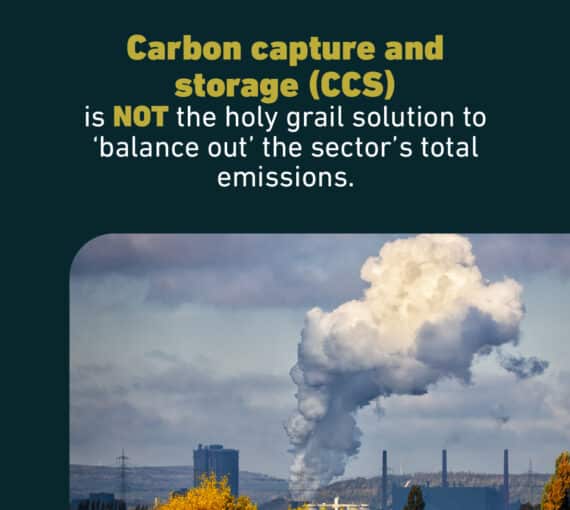
Relying on carbon capture
Big Oil’s targets for reducing emissions in Canada are not what they are made out to be. It only takes a quick look at the fine print to understand that industry is not planning for a future in which humanity reduces its production and consumption of harmful fossil fuels.
Carbon capture and storage technology is touted by industry as the holy grail solution to seemingly reduce the huge emissions associated with producing and refining oil and gas. But the expensive and energy-intensive technology has not proven itself up to the task of tackling Canada’s most environmentally damaging sector.
So next time you see carbon capture mentioned, challenge it for what it is: a distraction. We know we need to move away from fossil fuels to proven renewable energy.
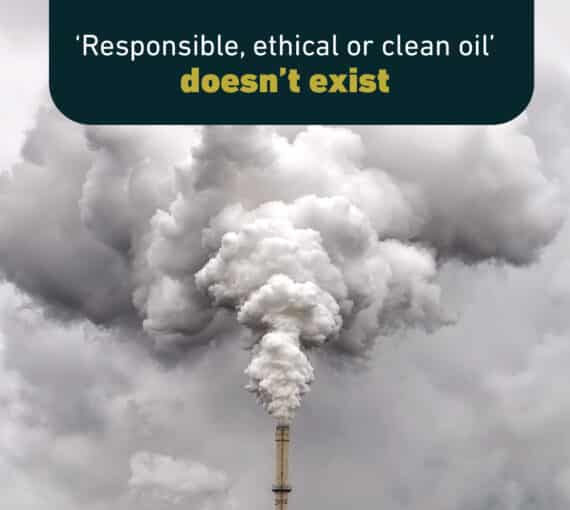
Greenwashing fossil fuels
It’s a tried and tested marketing tool: the rebrand. Industry has been using coordinated misinformation tactics for years and years. And in Canada it’s been no different.
The fossil fuel industry continues to rename its products, but we know better:
- Responsible, ethical or clean oil doesn’t exist. No form of oil is removed from the global market and no form of oil is less harmful.
- Natural gas is no more natural than coal or oil. And it’s just as harmful to our environment. We prefer fossil gas, or you could call it what it largely is: methane, a greenhouse gas about 80 times more potent than carbon dioxide over the short term.
- Liquefied natural gas (LNG) is not a ‘bridge fuel’. The idea that we need to invest in fossil fuels to make way for a renewable future doesn’t add up. We need to invest in proven, renewable energy now.
But It’s not just the fossil fuel industry. While banks are touting commitments to net-zero, the numbers show it’s all status quo.

Downplaying the power of renewables
Wind and solar are the cheapest forms of energy in history, but industry would have you think otherwise.
Wind and solar are also reliable, with advancements in energy storage and efficiency, and provinces working together.
Renewable energy is secure — energy made in Canada, used in Canada. And it creates jobs and new types of businesses, cooperatives and community-supported projects. Our recent research confirms this. Don’t let Big Oil get away with casting doubt on renewable energy.
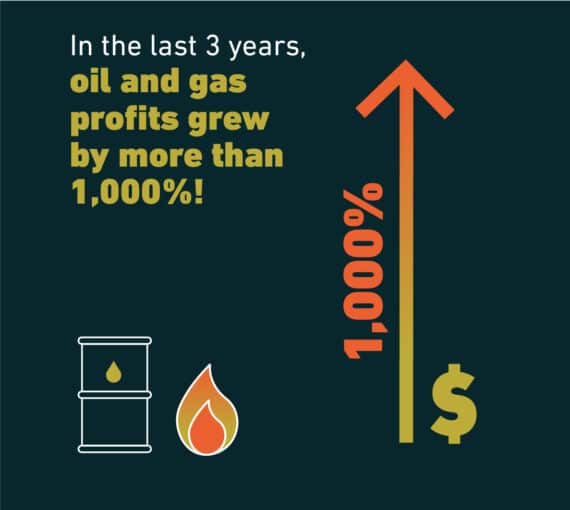
Driving inflation and asking for public money
Oil and gas companies are taking home record-breaking profits. In Canada, during the first three years of the pandemic, oil and gas profits grew more than any other sector — by more than 1,000 per cent! While people in Canada are struggling to pay for essentials like food and housing, industry is thriving.
A recent study found that oil and gas are drivers of inflation. Business as usual for Big Oil means a cost of living crisis for the rest of us.
Despite these profits, Big Oil is demanding the Canadian government foot the bill for its carbon capture facilities, worth billions.
We need to come together and challenge industry greed.
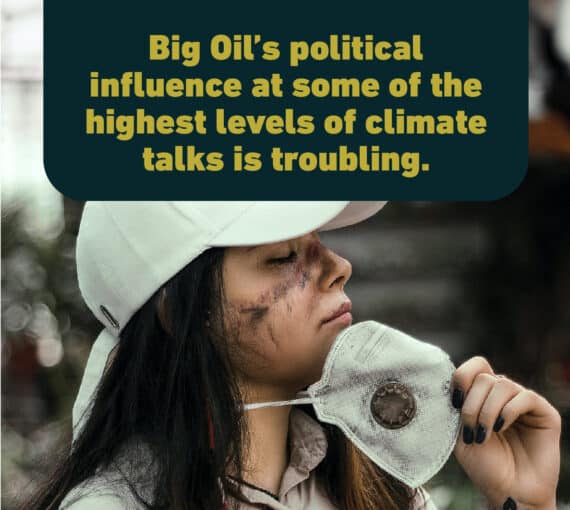
Delaying climate action
By engaging in deceptive tactics, Big Oil is delaying and blocking meaningful climate action. Big Oil’s political influence at some of the highest levels of climate talks is also troubling.
At last year’s COP27 climate summit in Egypt, Canada’s delegation included fossil fuel representatives like Enbridge. More than 600 fossil fuel representatives attended the conference. Looking ahead to COP28 in Dubai, the industry appears even more embedded with host United Arab Emirates’ delegation.
Plus, while industry delegates are allowed into the “blue” negotiating spaces, other voices (Indigenous, Global South, youth, etc.) are often relegated to the “green” spaces where no actual negotiations take place.
When we realized that smoking cigarettes was causing cancer and killing people, do you think we left it to tobacco representatives to write the regulations that now govern the industry? Obviously not.
We are at a critical moment and can’t let powerful companies block climate action.
Hold Big Oil accountable for its climate pollution
There are no current limits to the amount of climate pollution Canada’s oil and gas industry can emit. Capping oil and gas emissions is long overdue and critical for a livable climate.

